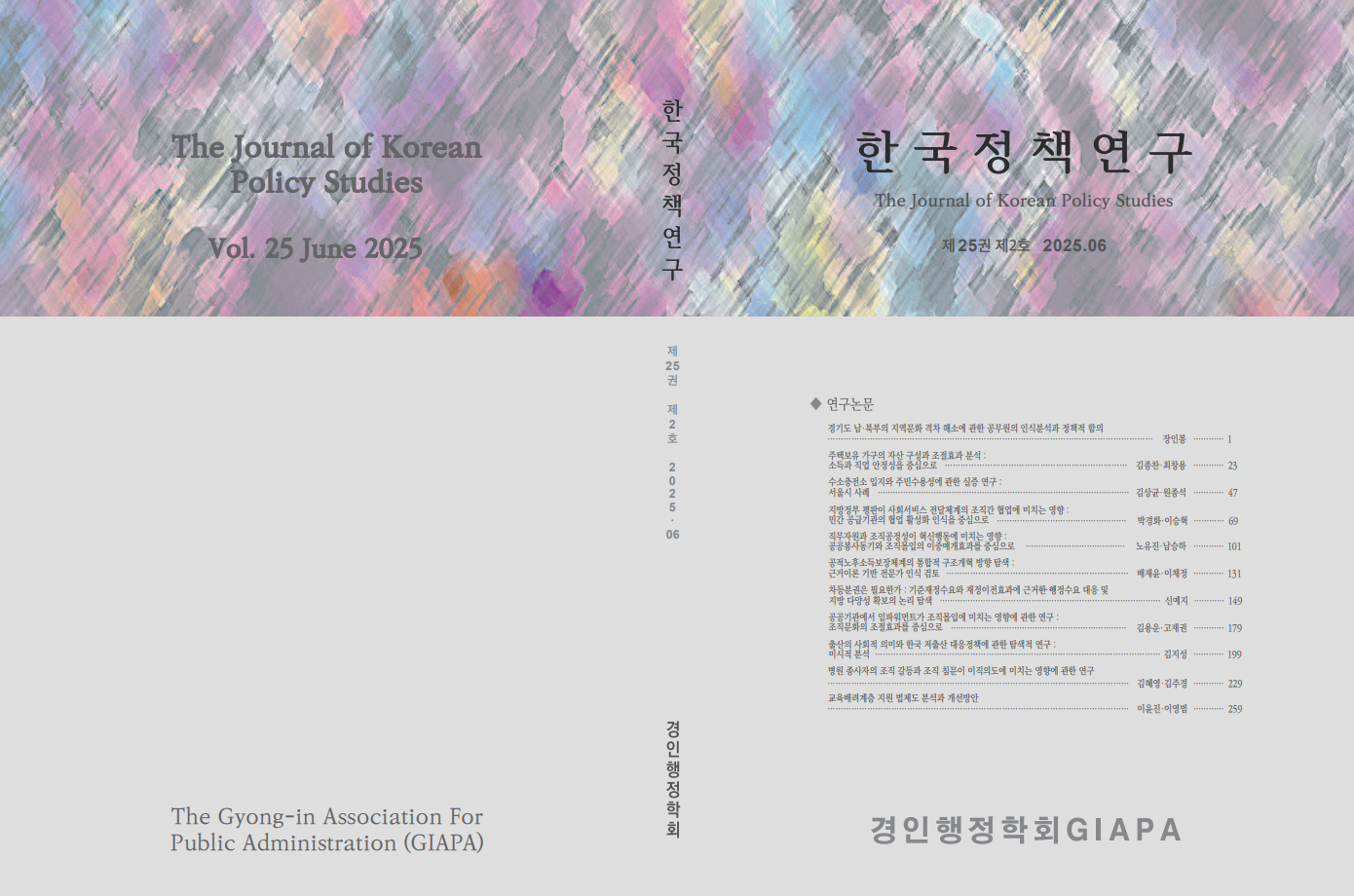수소충전소 입지와 주민수용성에 관한 실증 연구: 서울시 사례
An Empirical Study on the Siting of Hydrogen Fueling Stations and Public Acceptance: A Case of Seoul
- 창간연도
- 2002년 2월
- ISSN
- (Print)1598-7817 , (Online)2713-6744
- 등재사항
- KCI등재(2019.01 ~ 현재)
- 수록권호
- 제25권 2호
- 발행일
- 2025.06
- 수록논문
- 11 articles
- 유형
- 학술저널
- 주제
- 사회과학
- 발행기간
- 2002.02 ~ 2025.12
- 발행주기
- 연 4회(계간)
- 총 권호 수
- 78 volumes
- 총 논문 수
- 771 articles
키워드
초록
기후위기 대응과 에너지 전환이라는 시대적 요구 속에서, 수소전기차 및 수소충전소의 보급 확대는 중요한 정책 과제로 떠오르고 있으며, 이에 대한 주민수용성은 정책 성공의 핵심 변수이다. 이 연구는 서울 시민 1,000명을 대상으로 수소에너지 및 관련 인프라에 대한 인식과 수용성, 안전성 인식의 차이를 실증 분석하였다. 일원분산분석, 독립표본 t-검정, 카이제곱 검정 등 통계 분석 결과, 연령, 최종학력, 평소 안전에 대한 관심 수준이 인식과 수용성에 유의미한 영향을 주는 변수로 나타났다. 특히 연령이 낮고 평소 안전에 대한 관심이 높을수록 수소에너지에 대한 긍정적 평가와 수용 의향이 높았다. 학력이 높을수록 안전성 인식은 낮았지만, 충전을 위해 먼 거리까지 이동 의향이 높은 경향을 보였다. 반면, 거주 및 생활권역, 주거형태, 자동차운전면허 보유 여부 등은 대부분 유의미한 영향을 미치지 않았다. 이러한 결과는 수소 기반 교통 인프라 확산을 위해 인식 특성을 반영한 맞춤형 정책이 필요함을 시사한다.Amid the climate crisis and the global pursuit of energy transition, the expansion of hydrogen electric vehicles and hydrogen fueling stations has emerged as a critical policy agenda. Public acceptance plays a pivotal role in determining the success of such initiatives. This study empirically investigates the perceptions, acceptance levels, and safety concerns surrounding hydrogen energy and its infrastructure, based on a survey of 1,000 residents of Seoul. Statistical analyses—including one-way ANOVA, independent samples t-tests, and chi-square tests—indicate that age, educational attainment, and concern for safety are significant factors influencing public perception and acceptance. Younger individuals and those with a higher level of safety awareness exhibited more positive attitudes and a greater willingness to adopt hydrogen energy. Although respondents with higher education levels perceived lower safety, they were more willing to travel longer distances for hydrogen refueling. Conversely, variables such as residential location, housing type, and driver’s license ownership were not statistically significant. These findings underscore the importance of developing customized policy strategies that reflect public perception to effectively promote hydrogen-based transportation infrastructure.
목차
Ⅰ. 서론Ⅱ. 이론적 배경 및 선행연구
Ⅲ. 연구 내용 및 방법
Ⅳ. 분석 결과
Ⅴ. 제언 및 결론
참고문헌 (23)
- KDB 미래전략연구소. (2024). 「주요국의 에너지전환 정책동향 및 시사점」.
- 김동연・이선욱・이현우・김재경・유철희. (2024). 고압 수소 용기 폭발 압력이 방호벽 배면 지역에 미치는 영향 분석. 「한국수소및신에너지학회논문집」, 35(5): 563-571.
- 김소희・김서용. (2024). 수소충전소 수용성의 영향요인 분석: 에너지 정의와 지역이기주의의 역할을 중심으로. 「한국정책학회보」, 33(1): 39-85.
- 김흥식. (1993). 「지역이기주의 극복을 위한 정책연구」. 원주: 한국지방행정연구원.
- 무공해차 통합누리집. (n.d.).
- 백완기. (1995). 「행정학」. 서울: 박영사.
- 산업통상자원부. (2023.12). 청정수소 기반 생태계 전환과 기업투자 본격화한다.
- 수소경제 종합정보포털. (n.d.). 「연도별 국내 수소전기차 등록현황」.
- 정정화. (2015). 원전 건설의 주민수용성: 삼척 신규원전 갈등사례를 중심으로. 「한국사회와 행정연구」, 26(3): 167-199.
- Chen, T. Y., Huang, D. R., & Huang, A. Y. J. (2016). An empirical study on the public perception and acceptance of hydrogen energy in Taiwan. International Journal of Green Energy, 13(15): 1579-1584.
- Deutsch, M. (1973). The resolution of conflict: Constructive and destructive processes. New Haven: Yale University Press.
- Dlugos, G. (1981). The relationship between changing value systems, conflicts, and conflict-handling in the enterprise sector. In Management under differing value systems: Political, social, and economical perceptuals in a changing world (p. 660). Berlin and New York: Walter de Gruyter.
- Gervers, J. H. (1987). The NIMBY syndrome: Is it inevitable?. Environment: Science and Policy for Sustainable Development, 29(8): 18-43.
- Itaoka, K., Saito, A., & Sasaki, K. (2017). Public perception on hydrogen infrastructure in Japan: Influence of rollout of commercial fuel cell vehicles. International Journal of Hydrogen Energy, 42(11): 7290-7296.
- Kilmann, R. H., & Thomas, K. W. (1978). Four perspectives on conflict management: An attributional framework for organizing descriptive and normative theory. Academy of Management Review, 3(1): 59-68.
- Kunreuther, H., & Easterling, D. (1992). Gaining acceptance for noxious facilities with economic incentives. In The social response to environmental risk: Policy formulation in an age of uncertainty (pp. 151-186). Dordrecht: Springer Netherlands.
- Mazmanian, D., & Morell, D. (1990). The NIMBY syndrome: Facility siting and the failure of democratic discourse. In Environmental Policy in the 1990s: Toward a New Agenda (pp. 125-143).
- Oltra, C., Dütschke, E., Sala, R., Schneider, U., & Upham, P. (2017). The public acceptance of hydrogen fuel cell applications in Europe. Revista Internacional de Sociologia, 75(4).
- O’Garra, T., Mourato, S., & Pearson, P. (2005). Analysing awareness and acceptability of hydrogen vehicles: A London case study. International Journal of Hydrogen Energy, 30(6): 649-659.
- Pitney, J. J. (1984). Bile barrel politics: Siting unwanted facilities. Journal of Policy Analysis and Management, 3(3): 446-448.
- Tarigan, A. K., Bayer, S. B., Langhelle, O., & Thesen, G. (2012). Estimating determinants of public acceptance of hydrogen vehicles and refuelling stations in greater Stavanger. International Journal of Hydrogen Energy, 37(7): 6063-6073.
- Wüstenhagen, R., Wolsink, M., & Bürer, M. J. (2007). Social acceptance of renewable energy innovation: An introduction to the concept. Energy Policy, 35(5): 2683-2691.
- Yang, F., Wang, T., Deng, X., Dang, J., Huang, Z., Hu, S., ... & Ouyang, M. (2021). Review on hydrogen safety issues: Incident statistics, hydrogen diffusion, and detonation process. International Journal of Hydrogen Energy, 46(61): 31467-31488.0
참고문헌 더보기
- 이전논문주택보유 가구의 자산 구성과 조절효과 분석: 소득과 직업 안정성을 중심으로 An Analysis of Asset Composition and Moderating Effects in Homeowning Households: Focusing on Income and Occupational Stability
- 다음논문지방정부 평판이 사회서비스 전달체계의 조직간 협업에 미치는 영향 : 민간 공급기관의 협업 활성화 인식을 중심으로 The Impact of Local Government’s Bureaucratic Reputation on Inter-organizational Collaboration in the Social Service Delivery : Focusing on the Perception of Private Organizations




 경인행정학회
경인행정학회